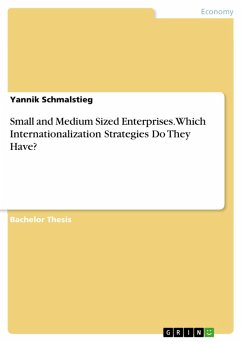Bachelor Thesis from the year 2017 in the subject Business economics - Business Management, Corporate Governance, grade: 1,0, University of Tubingen, language: English, abstract: Intriguingly, most research on internationalization strategies focuses on large, multinational enterprises. This is unjustifiable given the economic importance of small and medium-sized enterprises (SMEs) or the emergence of small firm types such as "Born Globals". The goal of this thesis is to undo the neglection of SMEs and provide fresh insights into the topic of SME internationalization from a strategic viewpoint. The thesis complements literature by thoroughly analyzing the relationships between the most important elements of small firm internationalization. By summarizing the extant literature about internationalization drivers and barriers, entry modes and strategies of SMEs, the understanding and appreciation of prevalent concepts will be fostered. The result, a conceptual interplay framework, provides a sound base for managerial decision-making and effective governmental policies that seek to promote SME internationalization. Furthermore, scholars might find it useful as a fruitful starting point for further research in the respective field. It is derived from the most relevant internationalization models and focuses on the strong interaction between networks, knowledge and the entrepreneur. Small in size and confronted with resource constraints, it is particularly difficult to cross national borders. This handicap is further fueled by the lack of academic literature which predominantly focuses on internationalization strategies of multinational enterprises (MNEs). It is widely known, however, that SMEs are not just smaller forms of MNEs. It follows that internationalization models for MNEs might not be suitable to describe small firm behavior. Olejnik thus argues that a distinction between process patterns of MNEs and SMEs has to be made. Differences between SMEs and MNEs exist, for example, in terms of resource endowment, knowledge levels or the importance of the owner/manager. Given the challenges for SMEs it appears that there is no room for small firms in the international environment. And yet, new company breeds like the so called "Born Globals" seem to offset the liabilities of small businesses. At the same time, major changes in information systems, communication systems and transportation have enabled SMEs to pursue international endeavors.
Dieser Download kann aus rechtlichen Gründen nur mit Rechnungsadresse in A, B, BG, CY, CZ, D, DK, EW, E, FIN, F, GR, HR, H, IRL, I, LT, L, LR, M, NL, PL, P, R, S, SLO, SK ausgeliefert werden.









